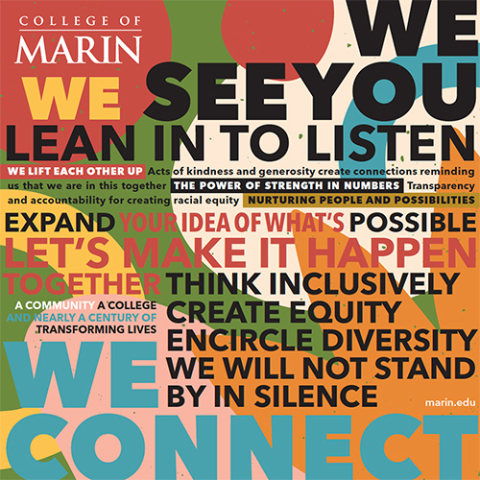
College of Marin (COM) got its start through community support. In turn, COM has been there for students and the community for almost a century. COVID–19 is shining a light on educational and social disparities, elevating a refrain COM has echoed since its founding in 1926—student support and student success go hand in hand.
Strength in Numbers
Just before spring break faculty, staff, and administrators worked to convert spring courses for remote delivery and transitioned critical student services to a virtual environment. This amazing feat—completed in about 10 days—is an accomplishment to be proud of.
After ongoing engagement with constituent groups, COM made the decision to continue with remote instruction through fall 2020. Faculty and staff were steadfast in their resolve to improve the quality of remote course delivery over the summer, honing newly gained skills through intensive training in pedagogical methods and use of new learning technologies.
Whether instruction is delivered on- or off-campus, the health and well-being of every member of our campus community remains our top priority. COM’s recovery plan will be updated at marin.edu, including protocols and procedures for an eventual safe return to campus.

How Will the College Continue to Support Students’ Financial and Basic Needs?
Since the pandemic began, the College has provided essentials such as laptops, cleaning supplies, personal protective equipment, and grocery gift cards. The Advancement Office has made emergency financial support available through the Student Emergency Assistance Fund (SEAF) to help with needs arising from the global health crisis.
Students can connect with peers, faculty, and staff in the College’s learning communities. Offices and departments across campus are working together to continue supporting students during this difficult time with counseling, basic needs assistance, and more of the tools that are essential to success.
COM is grateful for SEAF donations from faculty, staff, and community members. Just as the public health crisis continues, so does the need. Text the word SEAF to 91999 to contribute.
What’s Next for the LRC
The design phase of the Learning Resources Center (LRC) at Kentfield Campus has been placed on hold so that more community feedback and dialogue can happen. Your ideas help create a picture of how Marin County envisions its community college. Get project information and connect with COM’s Capital Projects Team: measurebcom.org
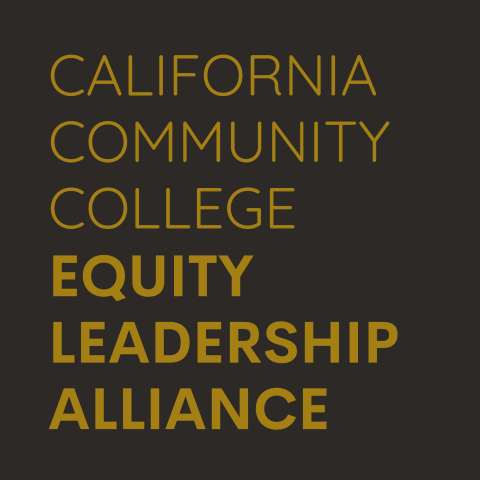
Building Racial Equity
In June COM increased ongoing equity efforts, joining the California Community College Equity Leadership Alliance.
The alliance, founded by Dr. Shaun Harper at the University of Southern California, was launched statewide to support community colleges in addressing issues of racial and educational inequities in the wake of mass protests fueled by the death of George Floyd in Minneapolis.
Superintendent/President David Wain Coon wants to ensure measurable actions are created to address “the systemic racism, inequities, and injustices that exist for Black and African Americans and other people of color.”
Eighteen COM employees attended the first cohort meeting, including Psychology Professor Yashica Crawford, Ph.D., and others who have been working on racial equity at the College. She was encouraged that the alliance “will provide us with the data and strategies to help strengthen our approaches.”
In 2017, COM started the Inclusion, Diversity, Equity, Action (IDEA) Committee to look at institutional racism in areas such as hiring methods to eliminate equity gaps. The College also expanded learning communities to help underrepresented students bridge gaps in equity and inclusion by increasing educational and cultural experiences.
COM remains committed to becoming a more racially equitable and inclusive campus for its students and employees. Dr. Crawford concludes, “I think COM—from the Board and our leadership to the students, staff and faculty, we’re ready and we look forward to creating a new future.”
News Release about the Equity Leadership Alliance (July 9, 2020)
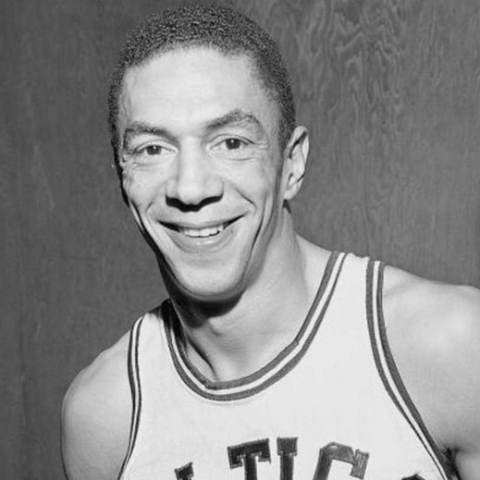
Honoring COM’s Trailblazing Basketball Alum
In a unanimous decision by the Board of Trustees, COM is naming their basketball court after renowned basketball alum, Don Barksdale. He is considered one of the most significant alumni to have attended the College.
Barksdale grew up in Oakland in the 1930s and 40s during legal racial segregation. He loved basketball from a young age but couldn’t play on his school teams because the coaches didn’t need another Black player.
After seeing Barksdale play in an East Bay park, COM’s basketball coach offered him a scholarship as a Mariner. This launched his basketball career and started a long list of firsts. Barksdale went on to be the first African American to play on the U.S. Olympic team. At 28, he was among the first African American men to play in the NBA, and was one of the highest paid in the entire league.
After his basketball career ended in 1955, he became a successful Bay Area radio host and entrepreneur well into the 80s. He even created a non-profit organization that helped save school sports in Oakland. Barksdale endured racism and ostracization to become one of the best players in game, paving the way for other players.
While the naming ceremony will be delayed until next spring, COM is honored to ensure the significant legacy of this remarkable alum will be commemorated for years to come!
College of Marin takes the firm stance that equitable education should be accessible to all members of our diverse community and proactively seeks actionable ways to dismantle institutional and systemic racism.
Encouraging Exploration in STEM Careers
Three College of Marin students had their interest piqued through the extraordinary professors who believed in them. The incredible opportunities at the College moved them to pursue STEM careers.
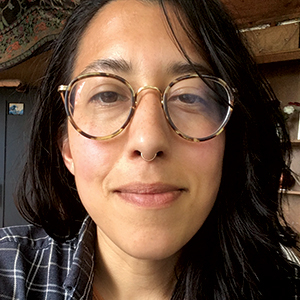
When Your Dreams Change Direction
Getting a coveted internship at the Lawrence Berkeley National Lab (LBNL) this summer wasn’t exactly where Jenna Nicolas thought she would be when she first started at COM. She originally wanted to go into Chinese Medicine and started her education at COM because of its affordability and proximity to her remote seashore community.
Even in her healthcare major, she took some behavioral STEM courses because, according to Nicolas, “they allowed you to understand the world around you in new ways.” After taking chemistry, computer science, mathematics, and psychology, her professors noticed and helped her realize she could get a career using the subjects she loved to study and become a behavioral biologist or neuroscientist.
She first learned about her internship from a presentation in COM’s STEM Learning Community, a supportive learning group for STEM students where all three of her STEM Professors Paul Daubenmire, Ph.D., Antonino Cucchiara, Ph.D., and Erik Dunmire, Ph.D., gave her outstanding recommendations. She will be interviewing STEM scientists on their mentoring practices in research labs to help discover an internship program that’s rewarding for both the scientist and intern.
“College of Marin has been the springboard for my ambition to enter STEM academics. As a low-income student, there is a financial balance I must maintain which can be stressful and, at times, limits the opportunities I am available for. At COM, I don’t face that barrier and feel free to fully challenge myself,” said Nicolas.
More about how Jenna's dream took a detour
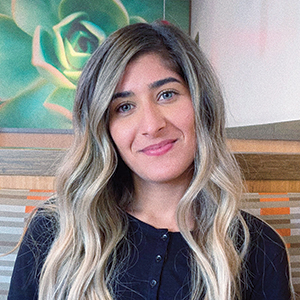
Use Life Lessons as Motivation
This spring, Odaiclet ‘Oda’ Piccinini found out she got into all four of the universities she applied to transfer to this fall. After much consideration, she chose the Cognitive Science program at UC Berkeley.
English is not Piccinini’s first language. As a first-generation immigrant from Venezuela, her motivation for starting at COM was to provide for family back home. “With a degree, the opportunities to grow as a professional are endless, and College of Marin gave me the opportunity to achieve that,” she said.
Instructor Jayme Goodale saw Oda’s innate talent for complex math and gave her confidence to pursue the subject. “She made me see that it was possible for a person like me to do well in math,” Piccinini said. “She is an example of a capable, compassionate, high-standards, yet strict teacher who has given me one of the most valuable lessons while going to school: Try your best, take one day at a time, and never give up.”
STEM courses in physics, programming, and engineering led her to explore becoming a cognitive scientist. Inspired by her STEM professors, she won a paid, undergraduate internship this summer at Northern Arizona University to collect and analyze astronomical findings.
Find out about Oda's dream to diversify the STEM field
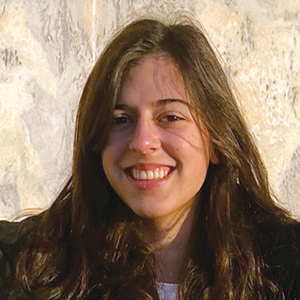
Learn Outside the Classroom
Alexandra Evans was instantly fascinated with astronomy after watching a meteor shower as a young child. “It was the first time I had ever felt so captivated; I fell in love with the sky,” she recalls. In kindergarten, she wanted to be an astronaut, and at eight years old she got her first telescope.
She knew attending COM first would not only save money but give her an excellent foundation. “COM has some really amazing STEM classes, and the course load I take still gives me enough time to focus on learning German,” she said.
Professor Cucchiara encourages learning outside the classroom through independent research opportunities, such as the distinguished Conference for Undergraduate Women in Physics. “One of the reasons I have felt so assured about my future, is because he gave me the support to reach out and take initiative in my career.”
After an amazing conference experience, Evans knew she made the right career choice. “Being able to explore these seminars with some pretty amazing people made me so excited for my future,” she said.
More about Alexandra's plans to study in Germany
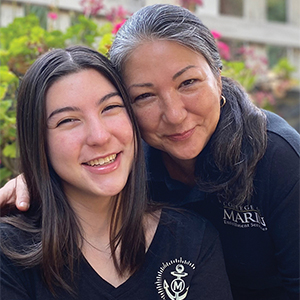
Nurturing People and Possibilities
Gina Longo has worked at COM for twenty-two years. Working in enrollment services, she is passionate about helping students to ensure they have what they need to reach their goals. “I usually end up with a few who then feel comfortable reaching out to me whenever they have questions throughout their entire time at COM,” states Gina, as has happened with connections made during College Success Saturday, an orientation for high school seniors going to COM.
Gina is thankful she can work from home, but she longs for the day she can socially interact with colleagues, help students, and see family and friends again.
Isabel Murrin, Gina’s daughter, is a double major at COM in Sociology and Spanish and is also a student ambassador. She also loves helping with College Success Saturday.
“Experiences like this specifically remind me of why I love working in outreach so much!” said Isabel.
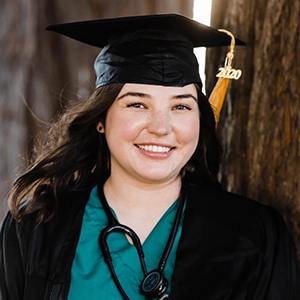 Milly Murrin, Gina’s older daughter, completed the Registered Nursing program this spring and feels strong ties to her fellow nursing students and instructors. “My favorite thing about College of Marin is all of the support I have been given throughout my educational journey. No matter what sub-community I was a part of, I was always welcomed with open arms and always given support.” After graduating, Milly was hired by Duke University Hospital in Durham, North Carolina.
Milly Murrin, Gina’s older daughter, completed the Registered Nursing program this spring and feels strong ties to her fellow nursing students and instructors. “My favorite thing about College of Marin is all of the support I have been given throughout my educational journey. No matter what sub-community I was a part of, I was always welcomed with open arms and always given support.” After graduating, Milly was hired by Duke University Hospital in Durham, North Carolina.
While COVID-19 public health orders moved everyone to stay home, it motivated Gina and her daughters to help others. Gina volunteered with Dine11, delivering food and necessities to healthcare and community workers. Isabel helped COM’s Outreach Team create a virtual campus tour so incoming students could see the campus, since in-person tours weren’t available.
Clinical training halted until COM’s dean of health sciences found a way. “Volunteering at the COVID-19 testing site was an amazing experience. The patients were so grateful; many thanked us through their fearful tears,” said Milly.
While many may call COM their family, for Gina Longo and her two daughters, the College truly is a family affair.
More about Gina, Isabel, and Milly
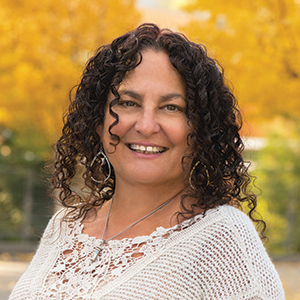
Don’t Put Your Future on Hold
In 2009, Lori Davis wasn’t happy in her career. She was a successful kitchen and bathroom designer in Marin, but she wasn’t making the environmental impact she wanted to make.
Her instructors’ dedication and passion for the subjects made Davis, “really passionate about how I could protect the environment, not only in design, but in my personal life, too.”
She joined COM’s Environmental Action Club to work with others on environmental sustainability. And this is where she first formulated an idea that would change the course of her life—delivering solar ovens to remote villages in Central America, enabling people to cook food, purify water, and earn an income without relying on wood, electricity, or propane.
After transferring to UC Berkeley to earn a bachelor’s degree in agrobiodiversity, Davis made her idea a reality and by doing so helped villagers become more self-reliant.
In 2012, Davis founded Sanzuma, a nonprofit organization dedicated to increasing access to healthy food sources for students in the Bay Area’s northern peninsula.
She realized many of the social and environmental issues she saw in Latin America existed in Marin. Being true to Sanzuma’s mission, “your health should not be a reflection of your economic status,” she turned the organization’s efforts to the development of a School Farm-to-Cafeteria program.
Since 2013, she led the conversion of many local school gardens into producing farms, pairing this with nutrition classes and educating students how to grow their own food. She now has over 75 local partnerships to create innovative models to expand the organization’s impact.
Davis credits COM as the birthplace of Sanzuma. Her journey proves that you can always learn new skills, change careers, and make a positive difference.
“Attending College of Marin completely changed my life. My trajectory is completely different," said Davis. "I was designing kitchens and bathrooms, and now I’m working with the community helping them learn about good nutrition and sustainability.”
More about Lori's journey after COM
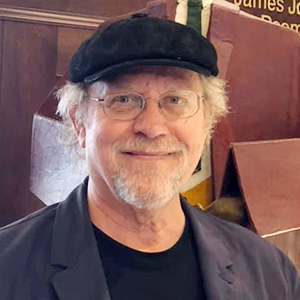
Of Stories and Storytellers
Lawrence Tjernell used literature in college to escape from hours of labs and lectures as a biology major. He developed a keen awareness for the voice of the storyteller, and honed his literary ear studying English in graduate school.
Tjernell started at COM in 1980, teaching basic English skills and computer technology classes. He thoroughly enjoyed guiding students through spirited debates on ethical issues and moral dilemmas to expand their critical-thinking skills. He found an even deeper satisfaction building a student’s confidence and seeing it revealed in an optimistic smile.
After retiring in 2015 to start a new chapter of his life, he created a small, independent publishing company called Longship Press. “As a teacher of literature, I came to understand that the treasure offered by fine books was invaluable, incalculable,” explained Tjernell. He found great use for the knowledge accumulated over his years of teaching and credits COM’s rich environment with the success of his most recent venture.
Along with other works, Longship Press publishes the literary journal Nostos. In the initial six issues, the journal included works by at least five current and retired COM faculty members.
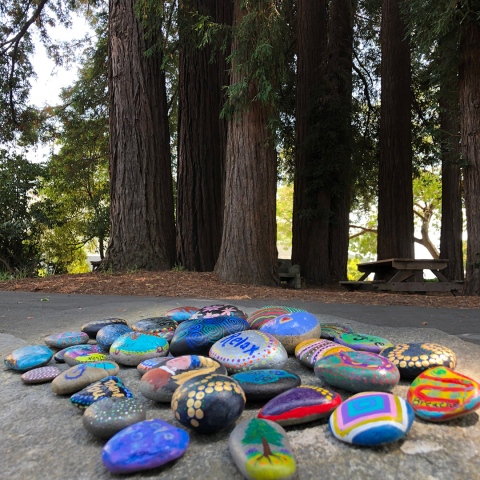
Marin Rocks
Dianne O’Donnelley, an employee in COM’s Mathematics and Sciences Department, began coming across painted rocks on her walks in spring 2018. This added new intrigue to her outings and led her to start the Facebook group #MarinRocks to create, paint, and release the rocks for her community to share and enjoy.
Before the stay at home order, O’Donnelley was always on the lookout for places to release rocks while walking around campus. “I prefer saying release rather than hide, because I want people to find them,” said O’Donnelley. “Though I really love all aspects of the project—from painting the rocks, to releasing the rocks, to sharing them—the part that gives me the most joy is when someone finds a rock I’ve painted and posts about it online.”
Crafting has filled a greater need during these challenging times. “I’ve been able to respond to what is happening around us by painting messages and pictures I thought others would find encouraging during these tough times, including a series of rocks saying thank you to healthcare workers, and some ‘stay safe, stay home’ rocks,” said O’Donnelley.
“We sometimes, especially as adults, don’t give ourselves permission to do fun, potentially messy stuff that isn’t for something.” The #MarinRocks Facebook page has info on how to get started. “It is anxiety relieving. It is fun! And, if you do that and can share it with other people, that makes it even better.”
According to O’Donnelley, the process often leads to unexpected connections. “It seems as if the rocks have a way of finding the right person at the right time.”
Find out more about #MarinRocks
Clarification: In the Building Racial Equity section, the article was updated to clarify that COM developed learning communities rather than the IDEA Committee.
